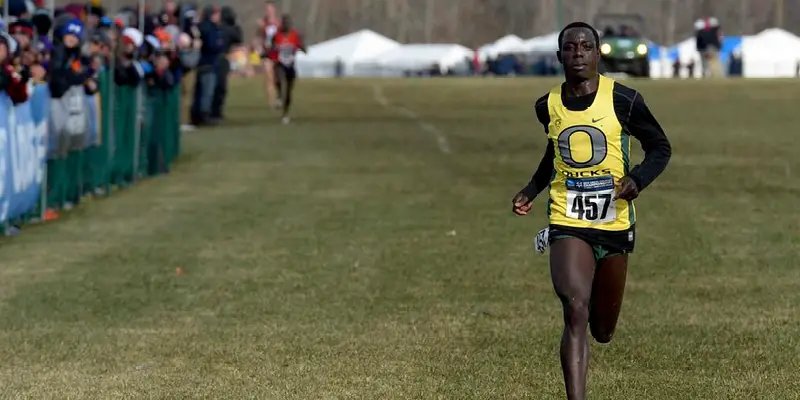With the indoor track season coming to a close, the last meet of the year is approaching and it is expected to be a shootout. Among the men, the two top teams are Oregon’s strength in distance versus Florida’s strength in the sprint and field events. The Ducks are sending six men in the distance events, wherein four are expected to compete twice. But there is one man on the team who has entered to run 3 races, and that is Edward Cheserek. He has entered to run the open mile, the 3000m, and either the 1200m or the 1600m leg of the Distance Medley Relay (which is going to remain a secret until race day). Despite losing only one championship race in his collegiate career, running three races back-to-back is not going to be a cake walk.
The DMR has been a complete mystery to everyone. So called “experts”, and even myself, predicted what the best team could be to run the DMR. Needless to say, no one had any idea what distance coach Andy Powell has going through his mind. All we know is that Eric Jenkins will not be anchoring the final leg of the DMR because he will be completing the 5000m just 15 minutes before the race starts. Cheserek opened the DMR at the MPSF Championships two weeks ago, but now at the NCAA meet, will Oregon have their fastest runner close the relay? Or will they put him in the shorter 1200m leg and try to save his energy for later?
In the open mile, Cheserek will have to go toe-to-toe with the season’s standout, Christian Soratos, of Montana State. Soratos has run the fastest collegiate time this year of 3:55.27 at the Husky Classic. Cheserek hardly ever shows how fast he truly is — he likes to run smart and conservatively during a race and then sprint at the end. In this event, it will go down to whoever has the fastest kick because it would be otherwise impossible to run away from someone who ran a time of 3:55.
In the 3000m, the competition for Cheserek will not come from runners who attend other schools, but his very own teammates. Jenkins, Will Geoghegan, and Jeramy Elkaim have all run the 1st, 2nd, and 4th fastest times this year, respectively. While this is great for the Ducks to score a ton of points, it puts more pressure on Cheserek to run harder than he would like. So when the 3000m rolls around, Cheserek will have already run two fast races. Ideally, to successfully triple, the easiest race would be last, but sadly the 3000m will probably be the hardest race he will run.
So the question remains, can he do it?
Top photo from Video
Related Articles:
Chip Kelly Update: Everything's Good Again ...
Chip Kelly Update: Wailing and Gnashing of Teeth
Shock and Awe -- The Oregon Ducks' Football Hangover Effect
Despite Lopsided Score, Georgia State "Never Stopped Believing"
Hope Springs Eternal for Ducks
Incompetent Pac-12 Officials: How Do You Miss ALL of THIS?
Isaac Gibson was born and raised in San Antonio, Texas when he decided to make his way up north to be a Duck. A former track and field athlete, he decided he wanted to live in Tracktown USA and attend school at The University of Oregon. He has always had a passion for sports and is looking to get more involved as well as refining his craft in writing.
His main focus is to bring the exciting sport of track and field further into the public eye, and what better team to cover than one of the current best in the nation and one so rich in history as the Ducks.
Isaac is a freshman in the school of journalism with as well as in the Pre-Law program at the U of O.


